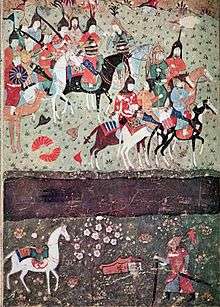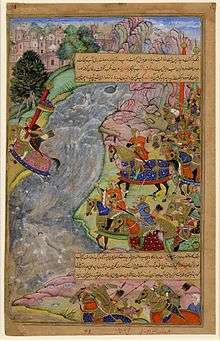Battle of Indus
| Battle of Indus | |||||||||
|---|---|---|---|---|---|---|---|---|---|
| Part of the Mongol invasion of Central Asia | |||||||||
 Genghis Khan watches in amazement as the Khwarezmi Jalal ad-Din prepares to ford the Indus. | |||||||||
| |||||||||
| Belligerents | |||||||||
| Mongol Empire | Khwarezmian Empire | ||||||||
| Commanders and leaders | |||||||||
| Genghis Khan | Jalal ad-Din Mingburnu | ||||||||
| Strength | |||||||||
| 30,000[1]–50,000 cavalry[2] |
| ||||||||
| Casualties and losses | |||||||||
| Unknown | Most of the army | ||||||||
The Battle of Indus was fought at the Indus river, in the year 1221 between Jalal ad-Din Mingburnu, the sultan of the Khwarezmid Empire and his only remaining forces of thirty thousand against the two hundred thousand strong Mongolian army of Genghis Khan.
Background
Jalal ad-Din Mingburnu was fleeing to India with his men and thousands of refugees from Persia, following the Mongol sacking of several cities, including Bukhara and Samarkand, the latter being the Khwarezmian capital. After having won the Battle of Parwan,[3] near the city of Ghazni, Jalal ad-Din Mingburnu headed for India to seek refuge together with his army of some 3,000 men and several thousand refugees.[2] However, a powerful army under Genghis Khan, numbering 25,000–50,000 cavalry, caught up with him when he was about to cross the river Indus.[2]
Battle

Jalal ad-Din positioned his army of at least thirty thousand men in a defensive stance against the Mongols, placing one flank against the mountains while his other flank was covered by a river bend.[3] The initial Mongol charge that opened the battle was beaten back.[3] Jalal al-Din counterattacked, and nearly breached the center of the Mongol army.[3] Genghis then sent a contingent of 10,000 men around the mountain to flank Jalal ad-Din's army.[3] With his army attacked from two directions and collapsing into chaos, Jalal al-Din fled across the Indus river.[3][2]
References
- 1 2 Trevor N. Dupuy and R. Ernest Dupuy, The Harper Encyclopedia of Military History, (Harper Collins Publishers, 1993), 366.
- 1 2 3 4 5 6 Sverdrup, Carl (2010). "Numbers in Mongol Warfare". Journal of Medieval Military History. Boydell Press. 8: 109–17 [p. 113]. ISBN 978-1-84383-596-7.
- 1 2 3 4 5 6 A Global Chronology of Conflict: From the Ancient World to the Modern Middle, Vol. I, ed. Spencer C. Tucker, (ABC-CLIO, 2010), 273.
Coordinates: 24°18′43″N 67°45′49″E / 24.312059°N 67.763672°E